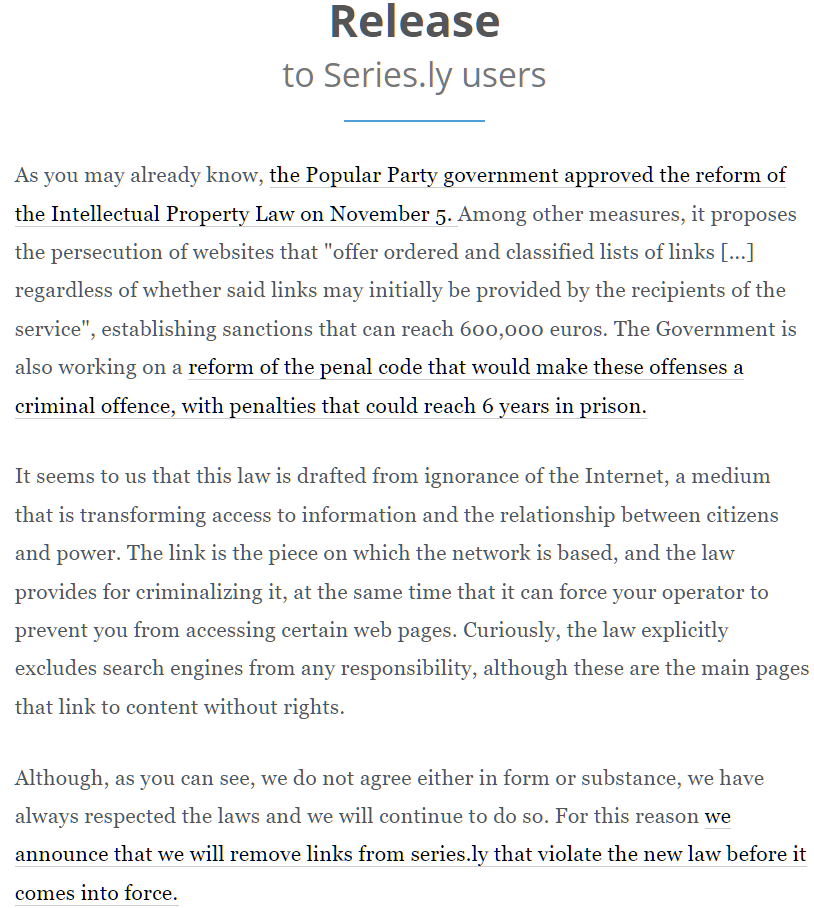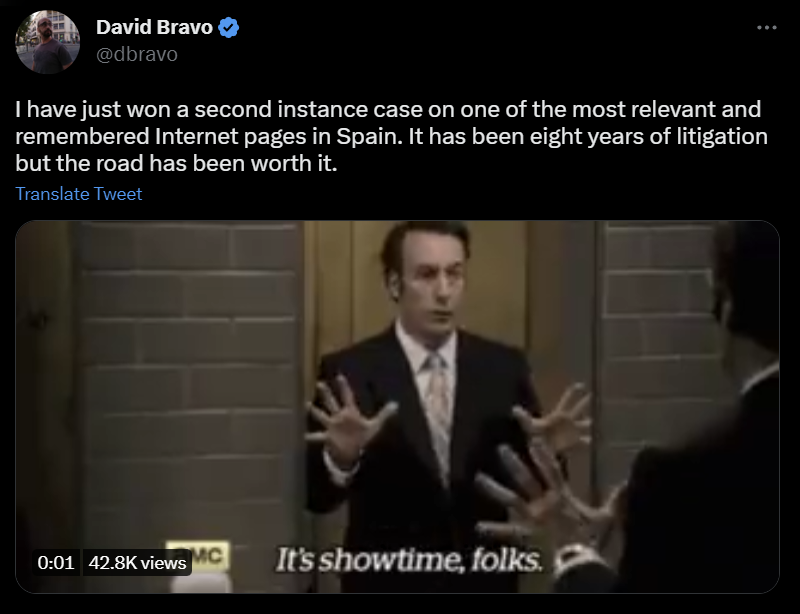 In 2014, David Tardà, Andreu Caritg, and Oriol Solé were hard at work in Spain developing Tviso, a service with a goal to unify legal streaming services into a centrally-accessed discovery hub.
In 2014, David Tardà, Andreu Caritg, and Oriol Solé were hard at work in Spain developing Tviso, a service with a goal to unify legal streaming services into a centrally-accessed discovery hub.
Tviso was a new venture for the Spaniards, although not an entirely unfamiliar one. At the same time, the men were also the operators of Series.ly, a then-four-year-old “social television” download site that aimed to blend the benefits of free access to premium TV series and movies with a walled-garden social network of entertainment media fans.
With a reported four million users, Series.ly was a success. It reportedly generated over 638,000 euros in the three years leading up to 2015, after which new legislation in Spain would render its activities illegal.
Police Raid Operators of Series.ly
Following a complaint from a local trade industry group representing U.S. rightsholders, and six months after the introduction of reformed intellectual property law in Spain, local authorities were ready to take action.
An investigation carried out by the Anti-Piracy Group of the Central Computer Security Brigade, with assistance from the Provincial Judicial Police Brigade of Barcelona, had linked Series.ly to a company operated by Tardà, Caritg, and Solé.

In the summer of 2015, Policía Nacional officers raided the company’s offices in search of evidence related to the operation of Series.ly. That included details of revenue generated by advertising and premium account sales to customers all over Europe, Switzerland, United States, Mexico, Chile and beyond.
The three men were arrested and subsequently charged with intellectual property crimes. It would be another seven years before they had their day in court.
Rightsholders Demand Four Years in Prison
Local police labeled Tardà, Caritg, and Solé a “criminal organization”. Rightsholders represented by the Association of National Videographic Distributors and Importers (ADIVAN), described the conduct of Series.ly’s operators as straightforward theft, for which four years in prison would be an appropriate sentence.
Still, a decision handed down by Criminal Court No. 1 of Sabadell in October 2022 found the men had committed no crimes. Before the new law came into force in Spain, linking to copyrighted content was not considered a crime. Indeed, the new law was introduced with this and other types of infringement in mind.
The defendants knew all about the change in legislation. In December 2014, Series.ly announced that due to the imminent arrival of the new law, the site would continue to exist strictly as a social network. All links that would violate the new law would be removed before it came into force to ensure the site was in full compliance.

“The fact that the legislator has expressly added the conduct [linking] that is the subject of this procedure, subsequently, indicates, as the defense stated, that, previously, said conduct was not typically criminal,” the judge noted.
Linking to copyrighted content had been established as “a new crime” under the new legislation and there was agreement the past conduct of the defendants would fit perfectly. The problem for the prosecution was that the new law wasn’t retrospective, and when it did come into force, the defendants had already stopped linking.
Rightsholders Appeal, Appeal Fails
After rightsholders represented by the Association of National Videographic Distributors and Importers (ADIVAN) appealed the decision, last week the Provincial Court of Barcelona acquitted the three men once again.
While he didn’t mention the case directly, defense lawyer David Bravo took to Twitter on Friday to announce a big win that had been eight years in the making.

According to Bravo, the prosecution knew there was evidence to show that Series.ly’s operators had stopped allowing links to external content, because police had obtained it during the raid in 2015.
“It is paradoxical that the ‘enter and search’ that was so publicized in the press as a ‘blow against piracy’ has nevertheless been the main evidence for the acquittal,” Bravo told ElDiario.
“The seized documents were legal opinions from their lawyer to maintain their activities legally, emails with the producers to eliminate the links that were reported to them, and even internal emails between the administrators who said they had to adapt to the new laws ‘however retrograde they are’.”
Other evidence seized from the men included internal conversations about a system to reward users who linked to legal services including Netflix.
“Not even I, as a defense counsel, could have provided more conclusive evidence,” Bravo added.
Rightsholders May Not Give Up
When local news outlet ElDiario requested comment from ADIVAN General Manager Santiago Mediano, he declined to comment, via a comment that made his group’s position clear.
“We at ADIVAN have the habit of not giving an opinion on cases that have not ended, like this one,” he said.
This implies that the Supreme Court may be asked to take on the case, but how that would help in the fight against piracy today is unclear. Two courts have already determined that the defendants stopped their activities eight years ago, so are no longer a piracy threat. Those courts also determined that the men committed no crimes.
Yet hundreds of sites are currently doing what the defendants never did, every single day, while legal resources are spent on a case that won’t reduce piracy in any measurable way, no matter who wins.





